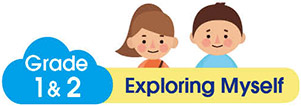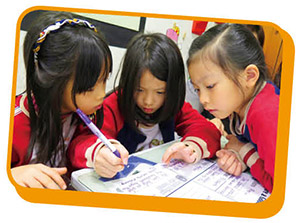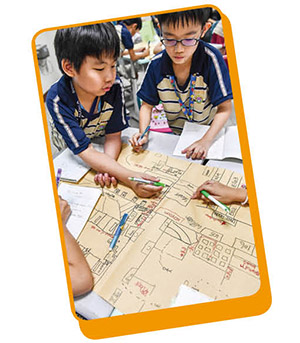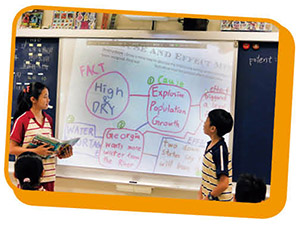
Raising a Globally Aware Citizen
國際處主任 賴國宜
As the world continues to become more interconnected, teaching children about global issues and engaging them in communication with people of different cultures is of huge importance. By engaging our students with real-life problems and global issues such as poverty, climate changes and water pollution, we aim to help them become global citizens who will take action to make the world a better place. Our Curriculum Coordinator, Mr. Harmon, introduces how theme-based projects involve students to explore the community and the world through a broad range of topics. Mr. Warmke elaborates on how sixth grade teachers are engaging students with real-life issues surrounding poverty. Through understanding the effects of poverty, students are inspired to take action by leading a school-wide donation drive. Please encourage your children to participate in the donation.
科技發達,縮短了國與國之間的距離,國際教育是協助學生從地球村的觀點認識人類相互依存、彼此合作的事實。在設計英語專題課程時,我們將認識世界及多元文化融入學習活動,透過國際議題的探討,培養學生世界公民的概念,進而對整個地球產生責任。藉著「貧窮」專題,六年級外師引導孩子深入探討貧窮問題發生的原因及其對個人、家庭甚至社會的影響,也啟發孩子思考自己可以做什麼去改善這個問題。希望孩子了解問題之後,能關懷弱勢並發揮自己的影響力。延伸於此專題,六年級學生將發起「為家扶中心扶助的孩子募集物資活動」,誠摯邀請各位家長鼓勵您的孩子響應此活動,跟著六年級的學長姐一起用行動去表達關懷。
You must be the change you want to see in the world.-----Mahatma Gandi

~ Jason Harmon
Curriculum Coordinator, International Department
We all have different inspirations, but one goal: a better world. Technology has connected the world and made global issues. Children have the capacity to deal with these issues if given the right skills. Theme-based project learning at Kang Chiao is our unique way of guiding our students to become global citizens; first by focusing on themselves, and later by expanding to their community and eventually our world.
The content of theme-based projects at Kang Chiao differs based on grade-level, but the purpose remains the same: develop global citizens who think globally while acting locally. The learning process starts with a theme extended from a text. The theme is integrated within existing curriculum to make it age and level appropriate. Cross-curricular lessons and group activities enable students to participate and reach a shared perspective. The end result is a learning experience that benefits students for years to come. Let’s take a look at some examples:

Before students learn about large issues, they must first understand themselves. That’s why themes in lower grades focus on the student as an individual. A grade one theme explored is Let’s Work Together. Students explore the theme by working together to plan and write a short play. As they work on their play, students take note of how each group member contributed. Their writing focuses on how each individual’s efforts improve the product of the group as a whole.


As students mature, they start to explore themes linking themselves to their community. In grade four, students explore Kang Chiao’s campus to Learn through Discovery. Students develop a plan to explore KCIS for places that offer learning opportunities. They collaboratively create a map of the school and discuss what areas benefit students. They start to understand how a community is designed to benefit the people who live in it, and that we must all respect the shared space we use.


In upper grades, students think globally by exploring themes relating themselves to the world. Grade six students delve into environmental issues of clean water during their Drip, Dry project. Students learn about causes of water shortage and its effects on people. They research products that help reduce pollution. The students use their research to write persuasively about how and why people in Taiwan should use eco-friendly products. Students are able to think globally and act locally.


![]() 全文下載)
全文下載)